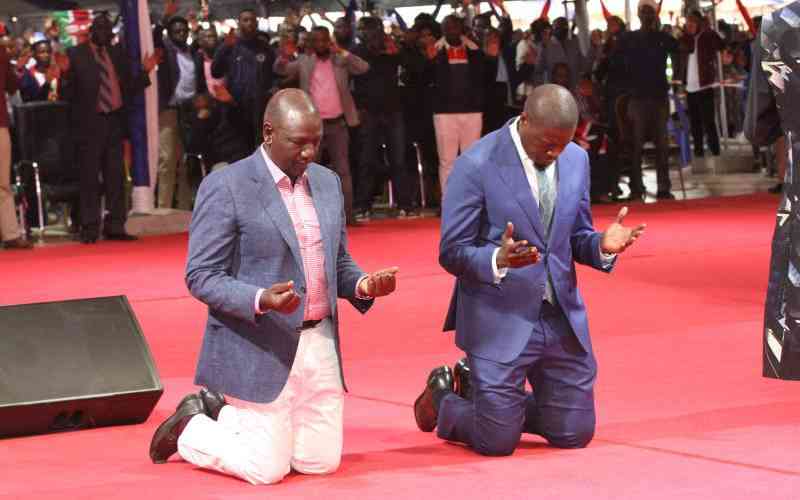In this February 2021 file photo, PDP leader Watson Duke enters the THA Assembly Legislature Building with meals from supporters when the assembly was in a 6-6 deadlock with the PNM after the January election. The PDP later won a second election on increased elecotral districts 14-1 in December. – FILE PHOTO/JEFF K MAYERS
DAYS after Progressive Democratic Patriots (PDP) political leader Watson Duke’s sudden resignation as deputy chief secretary, the Tobago House of Assembly (THA) meets in a special sitting on Monday, at the Shaw Park Cultural Complex.
The THA was originally scheduled to meet in a plenary sitting on Thursday at the Assembly Legislature. It is unclear as to whether this sitting will take place.
A notice from the Clerk of the Assembly on Friday said Monday’s sitting is expected to begin at 10.30 am but no motion or item for debate was listed on the order paper.
But speculation is rife that the sitting will address issues relating to Duke’s resignation as deputy chief secretary on Thursday and its implications for the operations of the THA.
Duke, who is currently in St Lucia, is the assemblyman for Roxborough/Argyle.
His resignation came more than one week after he accused the Farley Augustine-led THA of turning its backs on some 27 members of the Roxborough Folk Performers who had gone to perform at several cultural events in Tobago, in August.
The PDP leader, in a video posted on his Facebook page, chastised the THA for not providing the group with funding, outside of airfare, to cover their additional expenses.
As a result, he claimed they were stranded, stressed and hungry.
Augustine said contrary to Duke’s claims, the THA provided part-sponsorship to the group to the tune of $400,417.50.
Saying the THA could not provide additional funding owing its constraints, Augustine claimed Duke was aware of the situation.
Augustine subsequently said he was reviewing Duke’s performance as deputy chief secretary as he had not been fulfilling his responsibilities.
Duke responded by firing Augustine, Dr Faith BYisrael (Secretary of Health, Wellness and Social Protection) and Alicia Roberts-Patterson as deputy political leaders.
Augustine later dared Duke to bring a motion of no confidence against him in the THA. This move culminated in Duke’s resignation on Thursday.
Commenting on the development, Tobago Business Chamber chairman and attorney Martin George questioned the legality of the executive council following Duke’s resignation from the THA post.
In a WhatsApp video on Saturday, George said the issue has national implications.
Chief Secretary Farley Augustine during his budget presentation at the Assembly Legislature, Scarborough in June 2022. FILE PHOTO/THA –
“If there is no deputy chief secretary then, according to the THA Act, there can be no executive council because when one looks at the legislation and you look at what constitutes the executive council, it must include, the deputy chief secretary,” he said.
George said section 33 of the THA Act lists the deputy chief secretary as being one of the positions comprising the executive council.
“If there is no deputy chief secretary at present there is no executive council capable of running and managing the affairs of the THA legally.
“So it is a conundrum which must be addressed and which must be analysed and assessed in terms of the actions taken by the assembly in the interregnum since Mr Duke tendered his resignation.”
George also questioned the effectiveness of Duke’s resignation.
“Because when one looks at the purported resignation letter which Mr Duke tendered and proffered, it seems to be that that letter is addressed to Mr Farley Augustine in his capacity as Chief Secretary of the Tobago House of Assembly.”
He added, “If one considers the fact that Mr Augustine is not the one who appointed Mr Duke as deputy chief secretary, and Mr Augustine is not the one who administered to Mr Duke the oath of office as deputy chief secretary, then it begs the question as to whether a letter to Mr Augustine, purporting to resign your post as deputy chief secretary, is effective at all.
“That may be as effective as Mr Duke writing the letter to a family member or a neighbour and saying, ‘I tender my resignation as deputy chief secretary’ because if that’s not the person who appointed you, or who administered your oath of office, then sending a letter to them to say you resign may have no legal effect or efficacy whatsoever.”
According to the act, George said, the President is the one who administers the oath of office to the deputy chief secretary.
“In the past, we have seen persons who wish to demit that office, have sent their letters of resignation to the President.
“Thus far in the public space there has been no evidence I have seen from Mr Duke that he tendered any such a letter of resignation to the President.”
As such, George urged the THA executives to “tread cautiously and not end up with this purported resignation being a poisoned pawn in this chess game that is being played out in the THA.”
He further advised them to look carefully at the THA Act and standing orders.
“I, as an attorney-at-law, have perused the standing orders. I have checked other legislation. I have not seen any set procedure for handling the resignation of someone from the post of deputy chief secretary.”
He said there are procedures set out in section 19 of the act, which speak to resignations of people from the assembly.
“In other words, if you wish to give up your assembly seat and, therefore, trigger the process for a by-election there is a process set out there for you to tender that resignation.”
George added if the presiding officer wanted to tender a resignation, then there is a process also set out there in section 19 to tender it to the President.
“If the presiding officer, which has been administered the oath of office by the President is required by law to tender a resignation to the President in order to make it valid and effective, then the question arises, why would it also not apply, even though the legislation does not specifically set it out, why would it not apply also to the post of deputy chief secretary given the fact that Duke was administered that oath of office to deputy chief secretary by the President?
“It was not administered by the Chief Secretary and the Chief Secretary did not elect or appoint him to the post of deputy chief secretary.”
George said that election would have taken place among the assembly, comprising 15 assemblymen, four councillors and the presiding officer.
“So if those are the ones who have elected him then simply sending a letter to the Chief Secretary to say you resign may not necessarily satisfy the legal requirements of demitting the office of deputy chief secretary.”
George wondered if there is actually, at this time, a vacancy in the office of deputy chief secretary, saying it could potentially have legal ramifications.
“Because if Mr Augustine, as Chief Secretary and the other members of the assembly proceed to appoint someone when the post has not actually been effectively demitted they will end up in all sorts of legal entanglement by such appointment.
“These are not issues to take lightly because it also affects the issue of whether there is actually an executive council in place because if there was no valid and effective resignation the executive council remains in tact.
”If, however, there is no deputy chief secretary then Section 33 of the THA Act is pellucid in setting out the fact that a deputy chief secretary needs to be part of your executive council.
At his news conference on Thursday, Duke said he intends to sit on the opposite side of the assembly but not with the PNM.
“It will be Watson Duke of the PDP representing the people and Farley and friends on the other side. When Watson moves away, he carries the PDP with him. Wherever I am there is the PDP. It is owned by me.”





















Discussion about this post